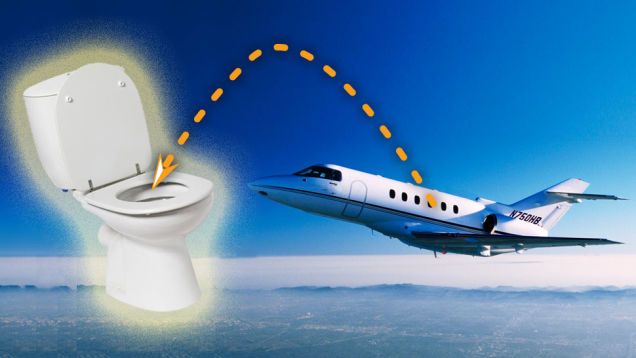
Poop collected from airline toilets may hold the key to help us track global disease outbreaks. In 2013, a team of researchers from the Technical University of Denmark received a special delivery: feces collected from the crew that cleaned the toilets of airliners from around the world.
From Wired.com:
Back in the lab, the researchers turned the samples into DNA soup and fed them through a sequencing machine. Out the other end came antimicrobial resistance genes and potential pathogens—all traceable to the individual plane’s country of origin.

BYPASS THE CENSORS
Sign up to get unfiltered news delivered straight to your inbox.
You can unsubscribe any time. By subscribing you agree to our Terms of Use
The Danish researchers, who published their study last month, are hardly the only scientists who see valuable health data being flushed down the toilet. At MIT, a group is looking to monitor both pathogens and drugs in the Cambridge sewer. And in February, a study found that the abundance of certain bacteria in sewage treatment reflected obesity rates in different US cities. Don’t pooh-pooh the idea. The fact is, human gut microbiome research is all the rage right now, and what is dipping into the sewer other than, you know, noninvasive sampling of the gut microbiome?
From the airplane waste, the Danish researchers could identify regional patterns. Genes for antimicrobial resistance, for example, were more abundant in samples from South Asia than North America. They found differences in specific bacteria, too: Salmonella enterica, which can cause diarrhea, was more common in South Asian samples while Clostridium difficile, the bacteria behind a difficult-to-treat hospital-acquired infection that often follows a course of antibiotics, was most common in North American samples. “It was good that we didn’t have really nasty things like anthrax,” says Thomas Sicheritz-Pontén, a molecular biologist at Technical University of Denmark who co-authored the paper.
Those really nasty things are out there, though, and Sicheritz-Pontén says DNA analysis of airplane poop could help flush out signs of emerging outbreaks. If the prevalence of certain bacteria coming from say, South America, suddenly shoots up 100 times, that’s an alarm bell. In contrast, the old-fashioned methods of surveillance—like tracking doctors’ reports—are slow and reactive. “When you’ve detected it, you already have an epidemic,” says Sicheritz-Pontén. The study is a proof of concept that bacterial genes of interest are detectable.
But DNA alone can be misleading. The DNA sequences of a pathogenic bacterium and its harmless cousin can be 80 to 90 percent identical; figuring out whether a given bacterium has the genes to be pathogenic is more laborious, but without the extra steps, scientists end up with a bunch of false positives. Case in point? Earlier this year, researchers analyzing the DNA found on the New York City subway system reported evidence of anthrax and plague, predictably freaking everyone out. The researchers soon backtracked, admitting their analysis was spotty.
That anthrax subway episode taught scientists a lesson. “If your end goal is to produce actionable public health info, you have to vet things more carefully before going public,” says Eric Alm, a microbiologist at MIT who heads the project to analyze sewage in Cambridge. (It’s called “Underworlds.”) Sicheritz-Pontén says that his colleagues are collaborating with experts on different pathogens to develop tests that confirm pathogenicity.
Meanwhile, analyzing toilet waste for public health is an idea still just floating around. “I’m not surprised that microbes vary between samples and they are related to the country of origin,” says Jonathan Eisen, a microbiologist at the University of California, Davis. “It’s a nice concept, but I’m not overwhelmed by the implications yet.” If scientists could actually link DNA sequences to an outbreak, they’d be onto something. Fortunately, science is commodious when it comes to accepting new ideas. If researchers need to plumb their imaginations for a new approach, well, that’s almost interesting enough (in lieu of actual results). They’re just doing their duty.

